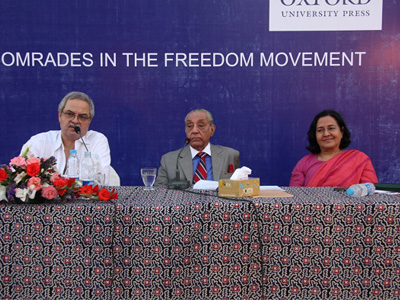Oxford University Press and Mohatta Palace Museum organize a talk on Jinnah and Tilak

Oxford University Press and Mohatta Palace Museum organized a talk titled Jinnah and Tilak: Comrades in the Freedom Struggle by the distinguished Indian lawyer, historian, and author, A. G. Noorani, on 16 March 2010, at the Mohatta Palace Museum. The talk was the third in the series of lectures Culture, Politics and Change in South Asia being organized by the Mohatta Palace Museum. The talk examined the forgotten comradeship between Jinnah and Tilak who, despite their differences, were passionate about the cause of Indian freedom. The photograph shows (from l to r): Hameed Haroon, Chief Executive, Dawn Media Group; A. G. Noorani; and Ameena Saiyid, Managing Director, Oxford University Press Pakistan.
Karachi, 16 March: As a part of the lecture series titled 'Culture, Politics and Change in South Asia' being organized by the Mohatta Palace Museum, Oxford University Press teamed up with the Museum to present a talk on Jinnah and Tilak: Comrades in the Freedom Struggle by the distinguished Indian lawyer and author, A. G. Noorani. Noorani is an advocate, Supreme Court of India, a historian, and a political commentator. He is an expert on constitutional and political issues and writes columns for Dawn, Frontline and Economic and Political Weekly and contributes regularly to Indian and foreign periodicals. He has authored several books including Islam and Jihad; Citizens’ Rights, Judges and State Accountability; The Kashmir Question; India: The Super Powers and the Neighbours; Constitutional Questions in India: The President, Parliament and the State; The Trial of Bhagat Singh: Politics of Justice and the recently published Jinnah and Tilak: Comrades in the Freedom Struggle.
Speaking on the occasion, Noorani, pointed out that a study of the relationship between Jinnah and Tilak is crucial as it reveals facets of their personalities which biographers so far have not cared to explore, and aspects of the freedom movement which have been neglected. Jinnah defended Tilak in 1916 in his trial on sedition charges and ultimately won his acquittal. Noorani is firmly of the view that Jinnah wanted a loose confederation in which the rights of the Muslim population were fully guaranteed rather than the separate state of Pakistan as it eventually emerged in 1947. He discussed Jinnah's tactics during the critical months in 1946 when the Cabinet Mission Plan was on the table, and argues that the Plan offered a viable possibility of avoiding Partition. In his opinion, the blame for its failure rests squarely with Congress and with Gandhi. Noorani emphasized that Indians and Pakistanis need to come to terms with Jinnah's personality. Indians must acknowledge the wrongs he suffered for long, and Pakistanis, the wrongs he himself went on to commit but both must appreciate his splendid record as a dedicated legislator committed to freedom, civil rights, and social reform.
In her welcome address, Ameena Saiyid, Managing Director, Oxford University Press, said that at the present juncture in history, India and Pakistan need to be reminded of what is and has historically been common between them. While it is natural to have different outlooks, engendered by the differences in our interests and backgrounds, such differences should not be allowed to grow, unchecked by reason, objectivity, and good intentions. She further added that one pragmatic reason for controlling belligerent divergences is that the two countries are neighbours and as such our fates are closely entwined. Hameed Haroon, Chief Executive, Dawn Media Group, also spoke on the occasion.
Close
